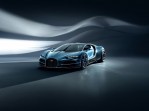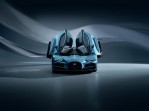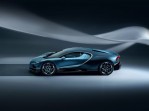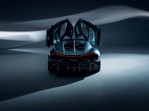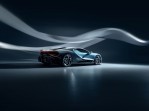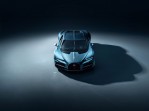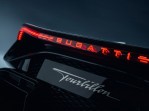Body style: Coupé (two-door)
Segment: Luxury
Infotainment: ![]() Apple CarPlay
Apple CarPlay ![]() Android Auto
Android Auto
Production years: 2024
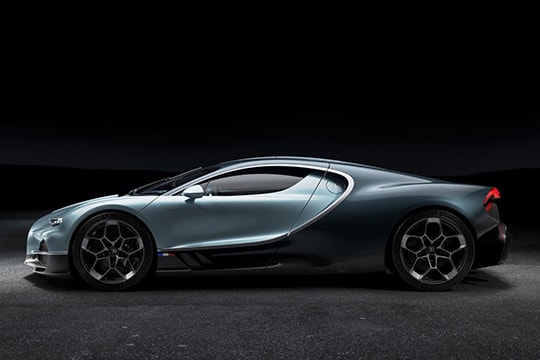 40 Photos
40 PhotosCreating a worthy successor for the highly-acclaimed Bugatti Chiron was challenging for the French brand owned partly by the Croatian car manufacturer Rimac and Porsche A.G.
Even though the Chiron was still on top of its game with the 1,500 PS (1,479 hp) W16 quad-turbocharged engine, the hypercar started to show its wrinkles. It had to be changed, but there were some financial difficulties that prevented Bugatti from replacing it. However, Bugatti was back on track after merging the French brand with the Croatian car manufacturer and handing over the keys to the empire to Mate Rimac. Even though Rimac was known for its record-breaking electric hypercar Nevera, the Tourbillon still used a gasoline-powered monster engine behind the cabin, which was helped by electric motors to achieve an even higher level of performance than any of the previous Bugattis ever built. The Tourbillon name was inspired by the Swiss watchmaker Breguet, who patented a unique mechanical system that enhanced wristwatch accuracy. Furthermore, the legacy of this high-precision mechanism was echoed in some of the hypercar's details.
Bugatti said that the 2026 Tourbillon, unveiled in June 2024, was sculptured by the wind. Even though that statement was previously used for other vehicles, it was entirely true. By using a high-speed wind tunnel, the car manufacturer created a low-slung front area with integrated wide LED headlights. Between them, the Tourbillon featured the brand's trademark grille shaped like a horseshoe, which was flanked on the lower side by broad functional air intakes split into two sides. A creased line that started on the vehicle's short nose resembled the one Bugatti put on the 1957 Type 57 Aerolithe model.
With a profile that resembled the Chiron and featuring C-shaped lines that concealed the massive side air intakes, the 2024 Bugatti Tourbillon looked ready to overtake its predecessor, the Chiron. On the front fenders, the automaker integrated the French flag on a smaller badge behind the wheel arches, while the side sills had a few functional vents. The car's muscular rear fenders were shaped like shoulders and confirmed the performance the Tourbillon was capable of. But the passion for details didn't stop there, and the automaker continued the creased line from the vehicle's nose on the roof and all the way to the back, between the cylinders' banks. Finally, out back, the automaker made a waved-shaped LED stripe on the upper side, while below was a huge functional diffuser that also integrated the four exhausts.
Inside, customers found a cockpit worthy of a multi-million dollar hypercar. Its most intriguing part was the instruments. The steering wheel's spokes were mounted behind the dials, so the driver had an unobstructed view of them at all times. These were analog dials that looked like Tourbillon watches with exposed mechanisms. In the middle were the speedometer and the tachometer, which shared the same dial, like a watch where the shorter arm was for the rev counter while the longer one showed the speed. On the right dial, the automaker placed the power reserve with two arms, which showed the power and torque delivered. The level of craftsmanship for them was second to none, and it could be compared only to those from wristwatches made by Breguet or other top-notch Swiss watchmakers. But that wasn't all. The seats were bolstered and had integrated headrests embroidered with the car's nameplate.
The technology concealed by the aerodynamic bodywork was utterly new for Bugatti, who ditched the former quad-turbocharged W16 solution from the Chiron to a new design. Behind the cabin, the automaker installed a naturally aspirated V16 engine that produced 1,000 PS (986 hp). The automaker also included three electric motors to increase the power of the entire assembly to 1,800 PS (1,775 hp) sent in all corners via an eight-speed (dual-clutch) automatic gearbox.
BUGATTI Tourbillon 2024
- 8.3L V16 8AT AWD (1800 HP)
BUGATTI Tourbillon
8.3L V16 8AT AWD (1800 HP)
ENGINE SPECS - 8.3L V16 8AT AWD (1800 HP) | |
|---|---|
| Cylinders: | V16 |
| Displacement: | 8300 cm3 |
| Power: | 735.5 KW @ - RPM 1000 HP @ - RPM 986 BHP @ - RPM |
| Torque: | 664 lb-ft @ - RPM 900 Nm @ - RPM |
| Electrical motor power: | 250.1 kw (340 hp) |
| Electrical motor torque: | 177 lb-ft (240 Nm) |
| Total maximum power: | 1323.9 kw (1800 hp) |
| Fuel: | Plug-in Hybrid |
PERFORMANCE SPECS | |
|---|---|
| Top Speed: | 277 mph (446 km/h) |
| Acceleration 0-62 Mph (0-100 kph): | 2 s |
TRANSMISSION SPECS | |
|---|---|
| Drive Type: | All Wheel Drive |
| Gearbox: | 8-speed automatic |
BRAKES SPECS | |
|---|---|
| Front: | Ventilated Discs |
| Rear: | Ventilated Discs |
TIRES SPECS | |
|---|---|
| Tire Size: | 285/35 R20 // 345/30 R21 |
DIMENSIONS | |
|---|---|
| Length: | 183.9 in (4671 mm) |
| Width: | 80.7 in (2050 mm) |
| Height: | 46.8 in (1189 mm) |
| Wheelbase: | 107.9 in (2741 mm) |
WEIGHT SPECS | |
|---|---|
| Unladen Weight: | 4398 lbs (1995 kg) |
POWER SYSTEM SPECS | |
|---|---|
| Power pack: | Lithium-Ion |
| Maximum Capacity: | 24.8 kWh |
| Range: | 37.3 miles (60.0 km) |
| Notes |
|---|
| Electric motor 1: 340 HP Electric motor 2: 340 HP Electric motor 3: 340 HP |




















